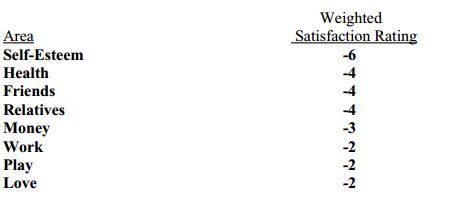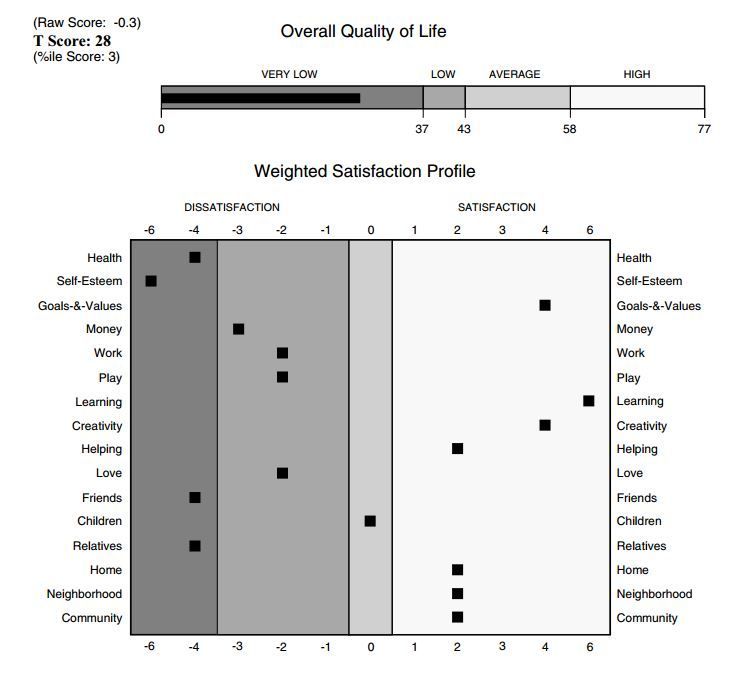Wellness Coach in Palm City
Introduction
The Quality of Life Inventory (QOLI) provides a score that indicates a person's overall satisfaction with life. People's life satisfaction is based on how well their needs, goals, and wishes are being met in important areas of life.
Overall Quality of Life Classification
This individual's satisfaction with life is Very Low. This person is extremely unhappy and unfulfilled in life. Individuals with scores in this range lack enthusiasm for life and feel that their lives lack meaning or purpose. They cannot get their basic needs met and cannot achieve their goals in important areas of life such as love, work, and retirement. If they have a list of goals they want to achieve in their lifetime, their overall success in doing so is extremely low. In general, their most cherished needs, goals, and wishes have not been fulfilled.
People with scores in this range may lack important skills needed for achieving their goals in life. They may also be in unrewarding or difficult circumstances that they must improve or abandon before they can have more meaningful and satisfying lives. They may be unduly pessimistic about their chances for happiness in key areas of life, and their standards for success or fulfillment in areas such as love, work, and retirement may be unrealistically high or impossible to attain.
People scoring in this range are at risk for experiencing problems in relationships, health, work, retirement, and educational activities or pursuits. These risks will remain until their scores reach or exceed the Average range. Very Low scores are an indication that they should re-evaluate their lifetime goals and find new and more effective ways to meet these goals. If they are not able to do this on their own, they should be evaluated by a primary care physician. Counseling or coaching is also recommended.
Weighted Satisfaction Profile

The Weighted Satisfaction Profile explains the basis for a person's overall happiness by identifying the specific areas of satisfaction and dissatisfaction that make up the overall QOLI score.
Weighted satisfaction ratings for each area in the Satisfaction Profile range from -6 (Extremely Dissatisfied) to 6 (Extremely Satisfied). Areas of life with positive satisfaction ratings indicate areas of fulfillment and strength for a person. In contrast, areas with negative satisfaction ratings (ratings of -6 and -4 are of greatest concern and urgency) indicate areas in need of improvement. The higher the negative rating, the more dissatisfied the person is in that area. Because overall satisfaction is determined by a person's satisfaction in specific areas, boosting satisfaction in some areas will also boost his or her overall sense of meaning, purpose, or satisfaction.
It is important to note that the QOLI omits areas of life from the overall satisfaction equation if the person indicated that they are not important. The QOLI also gives greater weight to areas of life that the individual rated Extremely Important than to those he or she rated Important. The reason for this is that satisfaction in areas that people care about the most (highly valued areas) has a greater influence on overall life satisfaction than the same level of satisfaction in areas of less importance.
Omitted Items
None omitted.
End of Report
NOTE: This and previous pages of this report contain trade secrets and are not to be released in response to requests under HIPAA (or any other data disclosure law that exempts trade secret information from release). Further, release in response to litigation discovery demands should be made only in accordance with your profession's ethical guidelines and under an appropriate protective order.

In Christian wellness, the concept of Jesus and the symbolism of a pendulum can be interpreted in various ways to promote spiritual, emotional, and physical well-being. Here are some ways in which the metaphor of Jesus and the pendulum can be applied to Christian wellness:
1. **Stability and Faith:** Jesus can be seen as the unchanging center and foundation of Christian faith, providing stability amidst life's uncertainties. Similar to a pendulum finding its center at rest, Christians can find peace and security in their relationship with Jesus, trusting in His promises and guidance.
2. **Balance and Harmony:** The swinging motion of a pendulum can symbolize the importance of balance and harmony in Christian wellness. Just as a pendulum moves back and forth, Christians may experience fluctuations in their spiritual journey. Finding balance in prayer, worship, service, and rest can lead to a more harmonious and fulfilling Christian life.
3. **Repentance and Renewal:** The swinging motion of a pendulum can also represent the process of repentance and renewal in Christian wellness. Just as a pendulum changes direction with each swing, Christians are called to turn away from sin, seek forgiveness, and strive for spiritual growth and transformation through Christ.
4. **Guidance and Direction:** Just as a pendulum can be used as a tool for direction or decision-making, Christians can look to Jesus for guidance and direction in their lives. By following His teachings and example, Christians can navigate life's challenges and make choices that align with their faith and values.
5. **Restoration and Healing:** The swinging motion of a pendulum can symbolize the journey of restoration and healing in Christian wellness. Through faith in Jesus, Christians believe in the power of His love and grace to bring wholeness and healing to body, mind, and spirit.
By integrating the symbolism of Jesus and the pendulum into Christian wellness practices, individuals can cultivate a deeper connection to their faith, find balance and harmony in their lives, seek guidance and direction from Christ, and experience restoration and healing in all aspects of their well-being.









